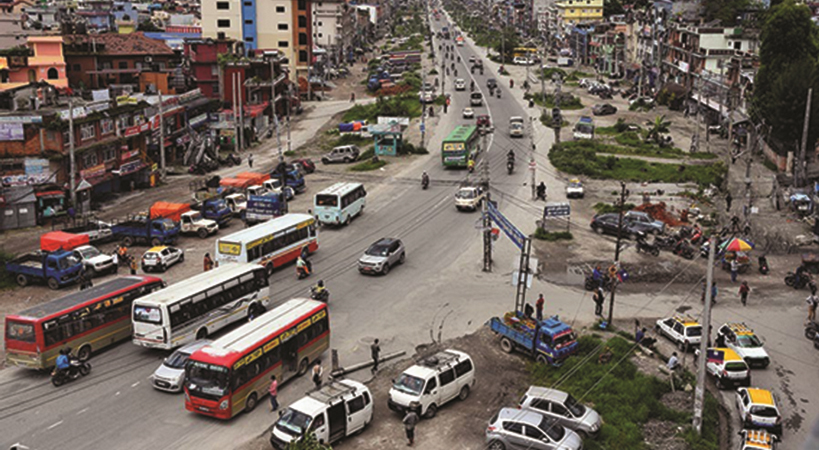Public vehicles largely obeying safety rules

By Aashish Mishra
Kathmandu, Aug 1: Sailuja Shrestha was pleasantly surprised when she boarded a bus from Patandhoka to Chappal Karkhana Tuesday morning. Clean seats, sanitizers for passengers and the driver and conductor wearing masks and gloves.
“I had been avoiding public vehicles because I was not convinced that they were taking proper precautions. But Tuesday’s travel made me feel safe,” she said.
Similarly, Prachanda Ram Chalise was seen boarding a microbus from Ratnapark to Hattiban Monday evening. He expressed reservations about using public transport but was satisfied with the safety measures.
“The microbuses carry only half their capacity and everyone is required to wear masks. While not ideal, it is as good as we can expect,” he said.
Public vehicles in the capital and all over the country are following the health protocols set by the government, informed Bijay Swar, senior vice president of the Federation of Nepalese National Transport Entrepreneurs Association.
“The situation is very difficult right now. The vehicles are not finding passengers and the restrictions on inter-district travel have brought this sector to the brink of collapse. Nevertheless, we are following the health criteria as required by the government,” he told The Rising Nepal.
“It is about us too,” said Ratu Kafle, who drives a bus around the Kathmandu Valley’s Ring Road. “If we cut corners or skimp on safety measures then we are also going to be at risk of infection.”
His conductor, who only wanted to be identified as Hem Bhai, complained that everyone was needlessly suspicious of them.
“The authorities and the general public think that we have no regard for health and will always put profits first. But this is about us too!” he exclaimed, adding, “We will be the first to contract the coronavirus if our vehicles are not safe. Why would we put ourselves in harm’s way?”
Swar agreed, claiming that private vehicles posed a greater risk of COVID-19 transmission at present than public vehicles. “Public vehicles are bound by the government’s health rules; private vehicles aren’t.” He added, “Currently, taking advantage of the lack of public vehicles, individuals and entities are transporting people in privately-owned automobiles with no social distancing, no safety measures and charging exorbitant prices.”
Superintendent of Police (SP) Bamdev Gautam, spokesperson for the Metropolitan Traffic Police Division, said that traffic police were rigorously monitoring the roads to ensure the vehicles’ compliance with the health protocol.
Traffic personnel are stationed on all the major roads and streets
of Kathmandu and are also monitoring the entry points into the valley, he informed, saying that police were strictly checking for vehicles carrying more than the allowed number of passengers, drivers and conductors not wearing masks or those charging fares higher than the authorised amount.
“The vehicles are found to be following the guidelines and those who don’t face a fine of up to Rs. 1,000. We also aware them about the risks of flouting health regulations during this outbreak,” he said.
Gautam informed that 168 vehicles had been fined for not following the health rules since the lockdown was lifted on July 21 to Tuesday evening. Of those not obeying the rules are vehicles driving on the outskirts of the valley and
smaller vehicles going to inner cities, observed Samyak Dongol.
“I come from Sankhu every day and the buses there are as crowded as ever,” he said. “I also frequently take the tempo to Gwarko and they also start cramming people in as soon as they cross Thapathali.”
Recent News

Do not make expressions casting dout on election: EC
14 Apr, 2022
CM Bhatta says may New Year 2079 BS inspire positive thinking
14 Apr, 2022
Three new cases, 44 recoveries in 24 hours
14 Apr, 2022
689 climbers of 84 teams so far acquire permits for climbing various peaks this spring season
14 Apr, 2022
How the rising cost of living crisis is impacting Nepal
14 Apr, 2022
US military confirms an interstellar meteor collided with Earth
14 Apr, 2022
Valneva Covid vaccine approved for use in UK
14 Apr, 2022
Chair Prachanda highlights need of unity among Maoist, Communist forces
14 Apr, 2022
Ranbir Kapoor and Alia Bhatt: Bollywood toasts star couple on wedding
14 Apr, 2022
President Bhandari confers decorations (Photo Feature)
14 Apr, 2022









